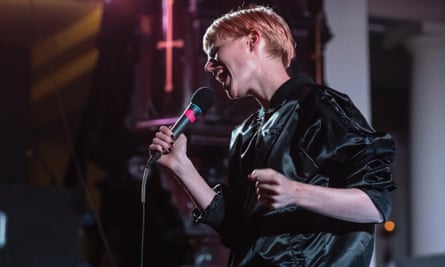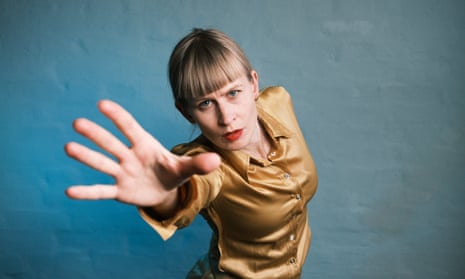In the autumn of 2019, Jenny Hval’s Paris show was interrupted by a rival spectacle – an impressive achievement, considering that a Hval gig already constitutes quite the extravaganza. Over the years, the experimental Norwegian singer-songwriter has been joined on stage by a huge inflatable clam, a projected image of a pregnant Angelina Jolie, a flower-throwing, banana-eating man and all manner of other leftfield antics. Yet it was something rather run of the mill that stole the audience’s attention on that evening: an in-crowd marriage proposal.
Years later, Hval is still reeling from witnessing that “very normcore display of romantic love” at one of her characteristically envelope-pushing shows. In fact, the ordeal had such a profound impact on the 41-year-old that she begins her eighth album, Classic Objects, by reliving it. “It was so programmed, so calm and so very performative – choreographed, getting down on one knee and all that,” she says from her home office in Oslo, looking Nordically stylish in a blue polo neck and blue jumper. Hval felt it was especially jarring – even ironic – because at the time she was performing her album The Practice of Love, a record expressly concerned with love that exists outside the bounds of romance and marriage: “Love that isn’t given language or ritual in mainstream society,” she explains.
There was another reason Hval couldn’t stop thinking about the proposal. Its conventionality perturbed her, which felt slightly hypocritical, considering she had recently got married. That she did something as traditional as tying the knot may surprise those familiar with her provocative, radical oeuvre: a collection of eerily intimate records that combine ominous synthscapes with high-pitched, sometimes skin-crawlingly delicate, vocals. Her lyrics about bodily fluids, pornography and masturbation can be eyebrow-raising (“I grab my cunt with my hand that isn’t clean,” she sings angelically on 2015’s Apocalypse, Girl), but Hval isn’t so much interested in shock value as in undertaking an often surreal interrogation of women’s place in society (on the same album, she refers to cupcakes as “the huge capitalist clit”).
Hval was certainly against marriage as a younger woman. “I was a bit of a brat with that earlier on in my life. I was arguing with people who enjoyed marriage, being quite political and structural about it.” As she explains in Year of Love, a dreamy number with a stilted groove that opens her new album, she agreed to what she calls a “patriarchal cornerstone” only for contractual reasons – specifically, the advantages married couples have in Norwegian law. “So my partner would be able to inherit my huge fortune,” she says. “Of almost nothing.”
Afterwards, she admits, she didn’t feel particularly conflicted. During our conversation, she repeatedly refers to marriage as “sweet”. I get the sense that letting go of preconceptions – and even closely held beliefs – has turned out to been an unexpected boon of the ageing process for Hval.
“The older you get, the more you’re going to challenge those black-and-white ideas that you had as a younger person, simply because you experience more things, you meet more people, you need to respect more people,” she says. “The older you get, the more complicated your life is, because you’ve done this and you’ve done that, anything could be [unearthed] to invalidate everything you say, and there’s something great about that, I think. You don’t make sense any more.
“It’s like before you’ve signed your first record contract; nobody can say you decided to let down your subculture and go to the industry, so it’s easy to criticise others. But I like that life and time make us less coherent.”
Classic Objects isn’t wholly preoccupied with marriage. Hval’s pandemic experience looms large over much of the record, with the legal restrictions placed on artistic performance providing plenty of food for thought. The fact that live music events were halted gave her the impression that her work was generally considered “dangerous yet unimportant” – the perfect perspective, she says, for “any authoritarian government” wanting to make changes to society.
Even as things open up again, Hval is concerned that the music industry is continuing its slide into a “more conservative” mindset, with the economic toll of multiple lockdowns cementing the shift. In order to guarantee ticket sales, venues that “started out as subcultural hubs” are now “hosting bands that are already signed and touring the world”, she says. The datafication of music also rewards existing success. “I wonder if that trend will just keep going now that we try to measure everything,” says Hval. “There are so many numbers – they can distort good creative decisions.”

Yet lockdown had its perks. Hval felt the physical benefits of pausing her itinerant lifestyle; she has coeliac disease and felt liberated from the constant challenge of finding suitable food while on tour. She also entered a period of cosy domesticity, spending time with her husband, who got very into fermenting food and looking after their puppy – a task that led to the semi-passive consumption of endless trashy movies, the only art form undemanding enough to accommodate the pair’s newly dog‑centric attention spans.
Hval came to the conclusion that she “would be quite happy to be a hermit artist”, but a recent return to live performance reminded her that touring’s sacrifices are accompanied by a unique joy. “There’s some kind of magic about being on stage that I only remember [when I’m there],” she says. “There are some parts of me that only exist in that stage moment.”
Instead of turning her into a permanent recluse, the pandemic, and the change of pace it required, fed into a new approach to songwriting: “simple stories” to echo her experience of a simpler life. The lyrics in Classic Objects are more immediately intelligible than on her previous offerings, but pared-back Hval is still rich and complex. The gorgeously searching, organ-backed American Coffee references everything from Guy Debord and her mother’s fear of driving to watching French cinema while suffering from a brutal UTI. She admits her songs “did get more adventurous than I anticipated”, which, in retrospect, she is relieved about. “Otherwise I think I would have written something that I didn’t actually agree with.”
This month, Hval is heading out on tour – and taking this more straightforward approach with her. It doesn’t sound like there will be much room for sealife-themed inflatables this time around; instead, she has decided to embrace the idea of humans playing music together in a room. “I feel like I’ve worked with challenging what a concert is for so long that I forgot the strengths of being in a band and doing a music performance,” she says with a smile. “So I’m really excited about that, although it sounds like it’s going to be a boring show.”
This seems unlikely. Hval might have toned down the outrageousness – and perhaps even mellowed with age – but you get the sense this boundary-pushing musician couldn’t do boring if she tried.
